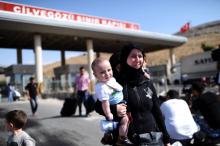bashar al assad

When a head of state is responsible for the deaths of 100,000 of his people and has used chemical weapons against innocent civilians — the world needs to respond. In one massive attack, the evidence appears to show that 1,429 people, including 400 children, suffered horrible deaths from chemical weapons banned by the international community. That is a profound moral crisis that requires an equivalent moral response. Doing nothing is not an option. But how should we respond, and what are moral principles for that response?
For Christians, I would suggest there are two principles that should guide our thinking. Other people of faith and moral sensibility might agree with this two-fold moral compass.

The Syrian civil war is increasingly drawing in nations across the Middle East, a regionwide conflict that threatens to pit world powers against each other and Muslim against Muslim.
On Wednesday, the United Nations Human Rights Council pushed through a resolution to investigate the abuses of the Syrian regime, over the objections of the regime’s ally Russia, who insisted the West was making matters worse.
U.S. Secretary of State John Kerry continued his travels in the region, trying to get all parties to agree to a peace conference in Geneva in the next few weeks. But councils representing the Syrian rebels again refused to join, demanding that representatives of Bashar Assad’s regime be banned.
In a war that is now clearly pitting the two main branches of the Islam — Sunni and Shiite Muslims — against one another, the dithering and differences between world powers is bringing about a desperate situation, according to experts.

What the heck is going on in Syria? If you are like me, you have a problem keeping all the players straight, and the unfamiliar Arab names don’t help. Thankfully, the Syrian president has a relatively easy name to remember, Bashar al-Assad, but keeping track of who’s who and which side they’re on is a real challenge. Frankly, even when I can keep track, I’m very skeptical that I am getting anything close to the truth from news outlets, the White House, or our State Department. The talk about a “red line,” no-fly zones, arming terrorists, and weapons of mass destruction sounds a lot like the falderal we were being fed going into the Iraq war. So what’s a good citizen of the world to do? If I can’t make sense of the news accounts myself, who can I find to help me out? And if I can’t trust my government to sort out the good guys from the bad guys for me, how can I ever figure out what, if anything, my government should be doing in my name?
I prefer my revolutions to be simple: A corrupt dictator/tyrant, an oppressed population, inspired reformers who risk their lives, calls for democracy, waves of marchers in the streets, background music from Les Misérables. The stories from Tunis and Cairo were epochal. The Arab spring was in full bloom as calls for participatory government could be heard from every corner of the Middle East.
Then there was Syria. The Assad government has been infamous in its intolerance to dissent. It is a military regime whose 30-year leadership under Hafez al-Assad (1930-2000) established it as one of the most severe in the region. In 2,000, after the death of Hafez, the world was intrigued to see his second son -- Bashar al-Assad -- ascend the throne. Bashar was an ophthalmologist who had studied in London, but because of his older brother's death in a car accident in 1994, he was called to follow his father. Bashar speaks English and French fluently and has been as critical of the U.S. as he has been of Israel.
!['Civil Rights March on Washington, D.C. [Dr. Martin Luther King, Jr., President of the Southern Christian Leadership Conference, and Mathew Ahmann, Executive Director of the National Catholic Conference for Interrracial Justice, in a crowd.], 08/28/1963' photo (c) 1963, The U.S. National Archives - license: http://www.flickr.com/commons/usage/](http://lh3.ggpht.com/-XUAmAA_vWKI/Ti7l4ZavSOI/AAAAAAAACS8/0Y0EfQ03QzA/Flickr-4101511358.jpg) How should music rank among the ever-growing list of time-tested nonviolent methods such as boycotts, marches, strikes, sit-ins, and vigils?
How should music rank among the ever-growing list of time-tested nonviolent methods such as boycotts, marches, strikes, sit-ins, and vigils?
Anthony Shadid of the New York Times reports that a song, "Come on Bashar, Leave," is spreading across Syria, boldly calling on President Bashar al-Assad to step down. (Bryan Farrell also wrote about it at the Waging Nonviolence blog.) The article suggests that a young cement layer who chanted it in demonstrations was pulled from the Orontes River this month, his throat having been cut, and, according to residents of the city of Hama, his vocal chords torn out. Hama is where, in 1982, then-president Hafez al-Assad, father of the current president named in the song, gave orders to the army to massacre more than 10,000 in putting down an Islamist upheaval. Today, boys 6-years-old and older vocalize their own rendition of the original warbler's song instead. As the song has sped across Syria, demonstrators have adopted it for themselves.